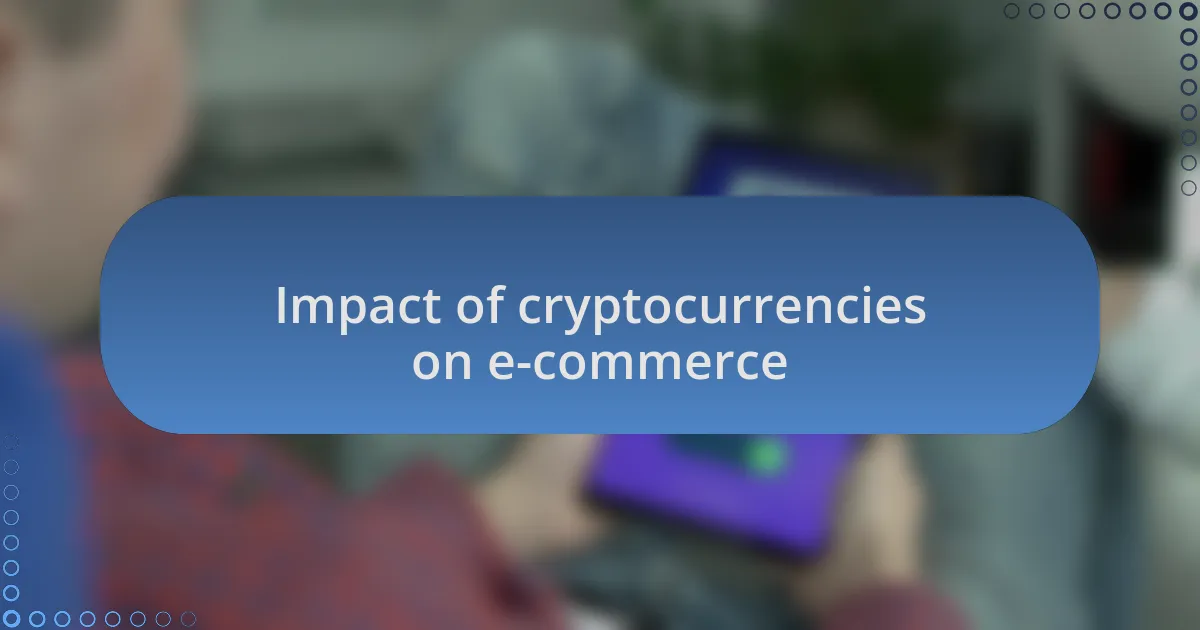Key takeaways:
- E-commerce has evolved from a cautious online shopping experience to a convenient and immediate process, heavily influenced by mobile technology and social media.
- Crypto analysis engines simplify complex cryptocurrency data, aiding both novice and experienced investors in making informed decisions.
- Cryptocurrencies enhance e-commerce by enabling faster transactions, fostering global reach, and introducing engaging loyalty programs.
- Trends in crypto include the rise of decentralized finance (DeFi) and non-fungible tokens (NFTs), prompting discussions about regulations that could impact innovation.

Overview of e-commerce evolution
The journey of e-commerce has truly transformed how we shop and interact with businesses. I remember when purchasing items online felt like a leap of faith—waiting days for delivery was nerve-wracking. Today, with same-day shipping and real-time tracking, the excitement of online shopping is tangible and instant.
Reflecting on this evolution, I can’t help but think about the profound impact of mobile technology. When smartphones became ubiquitous, they revolutionized the way we access online stores. Now, consumers can shop anytime, anywhere. Have you ever found yourself scanning through products during a boring meeting? I know I have, and it speaks volumes about the convenience that e-commerce provides.
Moreover, the rise of social media has created a vibrant marketplace that didn’t exist a couple of decades ago. Businesses now use platforms like Instagram and TikTok not just to sell, but to engage and build communities. It’s fascinating to think about how shopping has shifted from a purely transactional process to a social experience. Who would have thought that scrolling through our feeds could lead to discovering new favorite brands?

Definition of crypto analysis engines
Crypto analysis engines are specialized tools designed to evaluate and interpret data related to cryptocurrencies. They utilize sophisticated algorithms to analyze market trends, transaction volumes, and price fluctuations. From my experience, these engines are essential for traders who want to make informed decisions in a rapidly changing digital landscape.
What strikes me about crypto analysis engines is their ability to transform complex data into actionable insights. For instance, I once used a platform that provided real-time analytics on altcoin movements. It felt like having a financial expert in my pocket, guiding my trades and helping me avoid costly mistakes. Have you ever felt overwhelmed by the sheer amount of data in crypto markets? These engines simplify that experience, breaking it down into digestible pieces.
In essence, a crypto analysis engine serves as an invaluable resource for both novice and experienced investors. As I’ve navigated the crypto space, these tools have been my ally. Their insights often inspire a sense of confidence that empowers me to make strategic decisions, rather than relying solely on instinct or social media hype.

Role of technology in e-commerce
Technology plays a pivotal role in shaping the e-commerce landscape, enabling businesses to reach customers in innovative ways. I remember the first time I experienced a seamless online checkout process—it transformed my shopping habits. Regularly, I find myself gravitating towards platforms that utilize advanced payment technologies because they streamline the purchasing experience, making it convenient and quick.
Moreover, the integration of artificial intelligence in e-commerce has revolutionized customer experiences. For example, AI-driven recommendation engines analyze my previous purchases and browsing history, often suggesting products I didn’t even know I wanted. Have you ever noticed how some online stores seem to read your mind? This level of personalization not only enhances customer satisfaction but also increases sales conversions for businesses.
Lastly, let’s not forget the impact of mobile technology on e-commerce. I often shop using my smartphone, and the ease of mobile-responsive websites cannot be overstated. If a site isn’t optimized for mobile, I tend to abandon my cart in frustration. This reliance on mobile technology has pushed businesses to adapt quickly, ensuring that they don’t miss out on the vast audience that prefers shopping on the go.

Impact of cryptocurrencies on e-commerce
The rise of cryptocurrencies has introduced a significant shift in e-commerce dynamics, allowing for faster transactions and lower fees. I recall my first experience buying something online with Bitcoin; it felt like I was participating in a new wave of financial freedom. Have you ever thought about how empowering it is to make purchases without the traditional banking hurdles? This speed and efficiency can attract tech-savvy customers who value privacy and security in their transactions.
Additionally, the integration of digital currencies into e-commerce platforms is fostering greater global reach. I remember helping a friend set up a shop that accepted various cryptocurrencies, and we were amazed at how quickly it attracted international buyers. It’s fascinating to see an influx of customers from different countries, all able to transact with ease. This increased accessibility allows businesses, regardless of their size, to compete in a broader market landscape.
Cryptocurrencies are also fostering loyalty programs that are more engaging than ever. I’ve seen businesses incorporate crypto rewards for repeat purchases, which adds a layer of excitement to every transaction. Isn’t it thrilling to earn a custom token with each buy, which could potentially increase in value? This innovative approach not only enhances customer retention but also connects the brands more deeply with their customers, creating a strong sense of community.

Personal insights on crypto trends
The crypto landscape is ever-evolving, and I’ve noticed some striking trends lately. For instance, decentralized finance (DeFi) platforms are changing how we think about traditional banking. I remember feeling a rush of excitement the first time I explored yield farming; it was like stepping into an entirely new financial frontier. Have you ever felt that thrill when discovering a new way to earn on your investments?
Another trend I observe is the growing role of non-fungible tokens (NFTs) in digital ownership. I recently attended a virtual art exhibit where the artists showcased their NFTs, and I was amazed at how engaged the audience was. This new form of ownership not only empowers creators but also redefines how we perceive value in the digital world. It makes me wonder, how will the concept of ownership evolve as more assets transition into the crypto space?
Moreover, the conversation around regulatory frameworks is heating up. I often find myself reflecting on how essential regulations are to the maturation of cryptocurrencies. When I explore how governments are beginning to develop guidelines, I can’t help but feel a mix of optimism and caution. Will these regulations enhance security or stifle innovation? It’s these questions that keep the discourse around crypto dynamic and exciting.